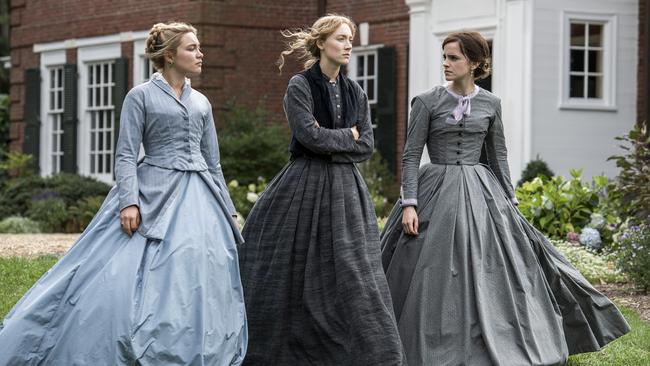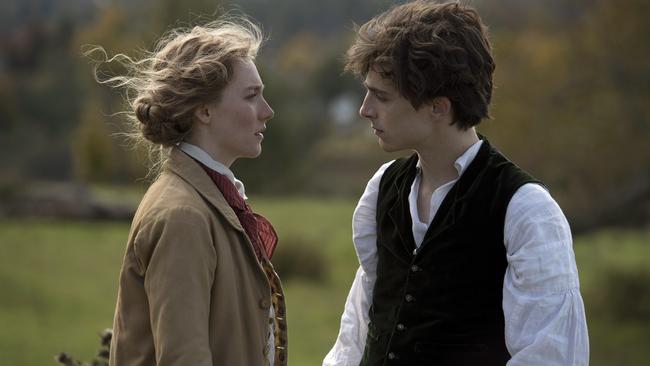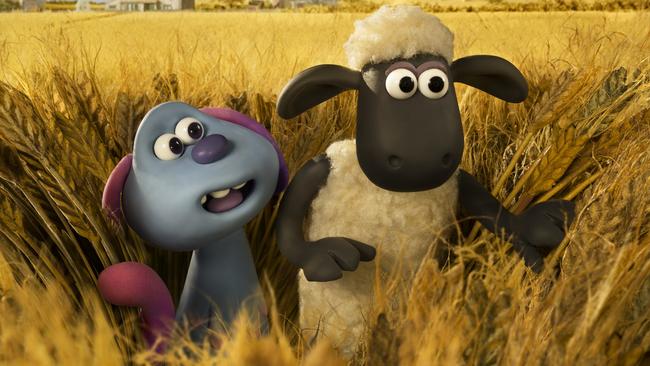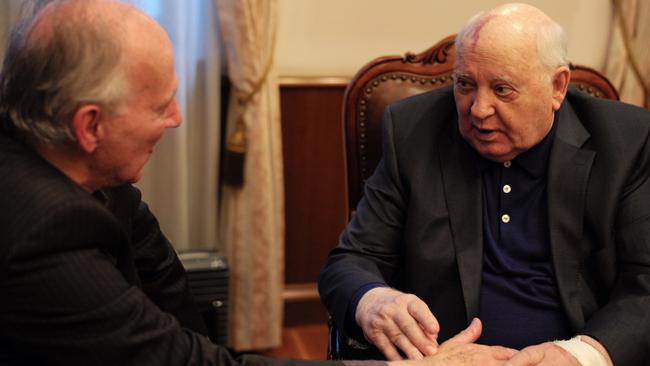Little Women review: irks and perks don’t spoil timeless world
Director Greta Gerwig has created a lavishly produced adaptation of the timeless tale of Little Women.

Louisa May Alcott’s semi-autobiographical novel, Little Women, was published in two parts in 1868-69 and has never been out of print.
The first of numerous screen versions was made in Britain in 1917; the more memorable adaptations since have been the 1933 production directed by George Cukor, with Katharine Hepburn as Jo and Gillian Armstrong’s 1994 version with Winona Ryder — there was also a rather inferior 1949 version directed by Mervyn LeRoy with June Allyson.
The latest incarnation, made by Greta Gerwig — who showed a natural talent for directing with Lady Bird — is a lavishly produced adaptation of the much-loved story of the four March sisters. Saoirse Ronan, who was also very good in Lady Bird, proves a perfect Jo.
In America, Little Women is mandatory reading, especially for girls; in Australia this is not the case, but it’s still a book that, with its portrait of resourceful and self-sacrificing female characters, seems timeless.
Gerwig has given it a modern tweak stressing the importance to these women of finding meaningful work. She also finds a positive way to confront the apparent anomaly in the book when Jo, who has professed a lack of interest in being a wife, marries a German professor who is decidedly past his prime. In Gerwig’s version, the professor, Friedrich Bhaer, is played by the very charismatic Louis Garrel.
In another attempt to bring something fresh to the familiar story, Gerwig has played around with the story’s continuity. Normally I’m not averse to time-shifting in movies, but in this case I found the device unhelpful. Individual scenes are superbly staged and the cast is flawless, making the film essential viewing for lovers of the book. But nevertheless it is, at times, a little bit irritating.

Gerwig, who scripted the adaptation, opens with a scene in which Jo nervously approaches a New York publisher, Mr Dashwood (Tracy Letts), with a story she’s written, though she pretends the author is a friend. Dashwood is not very encouraging at first, insisting on alterations and pointing out that “people want to be amused, not preached at”. Paying her $20, he advises her, in future, to “make it short and spicy and, if the central character is a girl, make sure she’s married or dead at the end”.
The following scene is set in Paris where Jo’s sister, Amy (Florence Pugh), who wants to be an artist, is travelling with acerbic Aunt March (Meryl Streep) when she has a chance encounter with Laurie (Timothee Chalamet), whom we later discover is the grandson of the Marchs’ widowed neighbour, Mr Laurence (Chris Cooper). We then move back seven years, when Mr March (Bob Odenkirk) is away fighting in the Civil War while, in the township of Concord, Massachusetts, his wife, Marmee (Laura Dern), is caring for their four daughters, the others being Meg (Emma Watson), who is content to marry a man she loves (James Norton), and, Beth (Eliza Scanlen), who is musical.
Memorable sequences are dotted throughout the film: The Marchs taking their Christmas breakfast to donate to their less fortunate neighbours; Meg at her first ball; Mr March’s homecoming; Beth playing the piano for Mr Cooper; Aunt March’s caustic commentaries; Jo getting to know Friedrich, whom she meets during her sojourn in a New York boarding house. The work of cinematographer Yorick Le Saux and of production designer Jess Gonchor is outstanding, and all of the characters, so vividly described by Alcott, come satisfactorily to life thanks to every member of the fine cast.
That seemingly haphazard continuity might bother some more than others; I found it unnecessary, but on the whole it doesn’t detract from Gerwig’s faithful approach to this timeless story about the lives and aspirations of four interesting young (not little) women.
Little Women (G)
Wide national release
★★★★
-
Slapstick jaunt in the countryside

Not long after the start of the latest Aardman Animation excursion into the delightfully silly world of Shaun the Sheep and his friends, there’s a scene in which a flying saucer lands close to the property owned by Farmer John.
The camera glides past a garage with the sign proclaiming the establishment is owned by H.G. Wheels. It’s a fleeting moment — no close-up — and I was the only one who laughed at the screening I attended, but the sly literary reference is at the core of the typically English humour that suffuses this latest clay animation delight.
The plot couldn’t be simpler. Inspired by E.T., with knowing references to Close Encounters of the Third Kind, 2001: A Space Odyssey, Alien, Doctor Who and The X Files, Farmageddon (advertised as A Shaun the Sheep Movie) follows the fortunes of a juvenile space invader named Lu-La who seemingly accidentally arrives in the English countryside and who just wants to go home.
She’s a cute, rotund creature with four long arms and her complexion shades from blue to pink to purple and back. Shaun becomes her best friend, while the myopic Farmer John, eager to cash in on the publicity engendered by the mysterious space arrival, quickly sets up the ramshackle theme park that gives the film its title.
Directors Richard Phelan and Will Becher tell this amiable, family-friendly story without recourse to dialogue, and some of the film’s slapstick evokes the early days of cinema in its skill and comic timing. It has a message of course — aliens, or foreigners, are just like us.
Though maybe not quite as original as the early Aardman productions, Farmageddon provides entirely satisfying holiday entertainment.
Farmageddon
Wide national release from Thrusday
★★★½
-
Revealing portrait of Soviet leader

“I love you,” says director/interviewer Werner Herzog to his subject, Mikhail Gorbachev, the last leader of the Soviet Union. It’s an odd declaration and it apparently stems from Herzog’s admiration for Gorbachev’s role in the reunification of his native Germany. Of course it confirms that Meeting Gorbachev — this interview documentary filmed two years ago — will not be terribly objective.
Yet it doesn’t matter all that much because the material is so interesting and Gorbachev is so charming, although he looks far from well — when the interviews took place he had recently been discharged from hospital.
Herzog sketches in his background (he was born to peasant parents in 1931 and his mother was illiterate all her life) and his rise through the Soviet Communist Party until his ascension to party leadership, whereupon he set about the reforms that proved more far-reaching than he had anticipated.
Talking heads include US politicians George B. Shultz and James A. Baker, who provide crucial insights, as do former Polish leader and politician Lech Walesa, former Hungarian leader Miklos Nemeth and German policy adviser Horst Teltschik.
The admiring Herzog asks a few embarrassing personal questions but Gorbachev is more than a match for him, and the film is never less than fascinating. This is a candid and revealing portrait of one of the greatest figures of the 20th century.
Meeting Gorbachev (G)
Limited release
★★★½




To join the conversation, please log in. Don't have an account? Register
Join the conversation, you are commenting as Logout